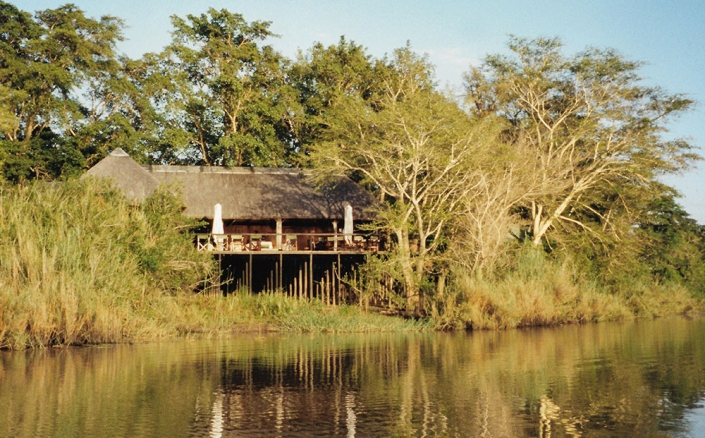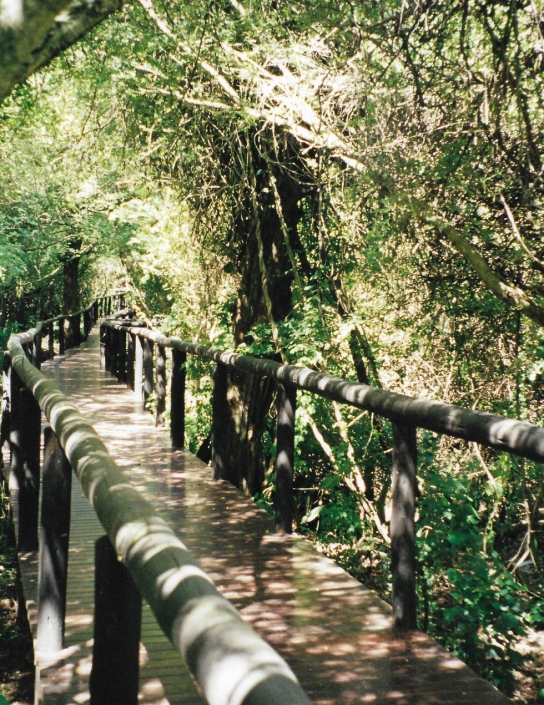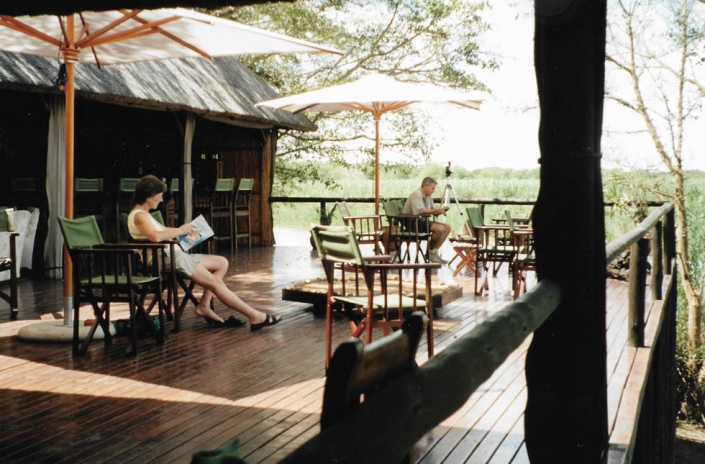Those Heart-Stopping Hippos of Ndumo
FOR a heart-stopping, adrenalin-charged and hyper-tense few minutes, I thought that maybe our number was up.
Whirr, splutter, cough, cough, pop went the un-co-operative outboard motor, once, twice and up to eight or ten times as our guide, face ever-reddening attempted to keep his cool…and his passengers from panicking.
The pod of thirty hippos which had been playing blissfully in the deep waters of the Usuto River where it spreads out into the vast Banzi flood pan of the Ndumo Wilderness Reserve, were not accustomed to having intruders in their midst.
They had rarely seen a boat before, and it was such an unusual occurrence, might have wondered if the Martians had arrived.
This is wildlife safari at its spine-tingling best as, at first, they wheeled around in unison to peer at us inquisitively, their beady eyes and Desperate Dan chins protruding as our flat-bottomed punt approached.
Then an adult bull broke away, bobbed under the coffee-coloured surface and, feet treading furiously as if running on the bottom, headed straight for us at a heart-stopping rate.
Our park ranger had earlier switched the engine off and turned the boat around to float in reverse gently and quietly towards them to give us a closer look as they snorted great plumes of spray into the air, making noises like some mighty herd of untamed stallions.
His plan was intelligent and simple: If any came too close for comfort, he’d fire the engine with the rope-pull starter, open up the throttle and we’d be off at speed and heading away from any potential danger.
Two tons
These great wallowing hulks weigh in at anything up to two tons apiece. If one chose to, and he had never before been close enough to test the theory, it could swim right under the lightweight aluminium-hulled craft and flip us over as if it was made of paper.
On the sandbanks lining the reed beds to the left and right, big crocs (and I mean monsters) were conserving their energy for just such a moment to present itself. They might seem lazy and cumbersome but are opportunist and can, as they say, make it snappy when the scent of dinner is in the air and they turn instantly into intense, single-minded and toothy torpedoes.
Earlier our guide had warned us: “Don’t fall in. You wouldn’t get back out again.”
The thought was enough to make his little eager group of passengers gulp even though there was at that time nothing much to make the pulse race apart from a flock of bright yellow weaver birds which darted out before us.
Now, those words returned like a spear to the heart as we surveyed each of the banks which seemed half a mile away, looking for a fallen tree or branch to cling to if we were forced to attempt to break the record for a two-and-a-half second crawl.
I thought, “this is it”, no kidding, as he tugged and pulled at the starter chord and each time the motor failed to respond to his increasingly frantic efforts.
As he yanked with one hand, the other tweaked and tinkered furtively with the fuel settings as he fought to get that stubborn thing to fire into life.
Silence
Hearts in mouths, we watched in concentrated silence attempting to see where the big pink face the size of an easy chair would surface next.
Then, with a roar, the engine finally burst into life and the prow lifted dramatically as, full throttle, we sped off as fast as the propeller could churn the depths.
That instant, a line of bubbles broke the surface and shot past on the left leaving a telltale trail that the hippo had gathered up a considerable head of steam before us.
Up ahead he surfaced in the centre of the channel to block our course.
Now even more determined to get us out of that still potentially difficult predicament, our boatman jerked the tiller over to take us safely out of reach.
No words had until now been spoken.
When the first utterance came, attempting to be calm and reassuring all at once, our relieved guide stressed that we had never been in any REAL danger.
“They can become aggressive.
“If they come at you with head and chest out of the water and mouth wide open, that’s when you know it’s time to go,” he said.
It niggled for a second that the dramatic encounter had maybe all been immaculately staged for added dramatic effect.
…That night, the outboard engine was stripped and overhauled for peace of mind.
Those who think the game drive business in South Africa provides little more than a chance to cruise through the bush and gaze at docile creatures so accustomed to human presence they are almost semi-tame, are kidding themselves.
You have to have your wits about you at all times – if even just to ward off the attentions of the dreaded mosquito.
Tented rooms
The Ndumo Wilderness Lodge in northern KwaZulu-Natal, just three kilometres from the Mozambique border, enjoys a fantastic location and can accommodate up to sixteen paying guests in comfortable tented rooms, each perched high on stilts over the water’s edge.
A wooden deck links the accommodation pods to the central viewing platform which sits beneath giant prehistoric-like Sycamore Fig trees.
All around are ten thousand hectares of bush, woodland and marsh. The water itself is teeming with snapping Tiger Fish which leap out to take insects…and there are plenty of those.
Up on the deck, you watch Stork, Egret and Heron fishing for a living. Wild boar, buck and porcupine forage below for titbits.
The park is a birdwatchers’ paradise attracting serious twitchers from around the globe. There are an amazing 420 species to be found here, the names of the rarer star turns being every bit as exotic as their remarkable calls, including the Green Coucal, Georgeous Bush Shrike and Pink-Throated Twinspot.
The wilderness camp experience is exhilarating on many fronts. It’s no Windsor Safari Park-type soft option but real-life remote and raw South Africa, long ago protected for its unique attractions.
As a result, as well as snakes and lizards, there are slugs and snails the size of a grown man’s fist and creepy crawlies both beautiful, intriguing and downright horrible all sharing the space.
Mosquitoes
Those overly-playful hippos apart, the mosquito presents the most obvious challenge, and protection at all times by way of prescribed pills and strong sprays and roll-on remedies are the first step towards ensuring a bite – and illness-free – stay.
The shower room attached to the accommodation tents is mercifully stocked with all of the heavy-duty sock-it-to-them repellents required in this malaria-risk region and we are advised to cake ourselves against attack.
It’s a small price to pay for the pleasure of soaking up what is one of the most intoxicating places in the packed-with-riches continent.
Thank goodness, there are over 850 fabulous butterflies to be found, helping to redress the balance in this ugly bug ball.
An early morning game drive (up at 5am for a bite of breakfast and off into the bush half an hour after so that we avoid the baking heat which later in the day chases animals off to seek some shade) provides further excitement.
Two minutes from the main camp we round a bend on the dirt track and find an unmoveable road block impeding our progress. A giant white rhino built like an armoured personnel carrier is snoozing in our path. Our driver, Phillip Khumalo, a Zulu with incredible skills, cuts the engine and we just sit and watch and wait.
Eventually he wakens and ambles off, taking his time to let us know who’s boss.
Later we disturb a family of giraffe, all gangly and graceful at the same time as they lope off in a slo-mo gallop.
Stunning plumage
Our ranger displays remarkable talents for the serious bird spotters along for the ride. He developed his skills as a teenager wandering through the bush and can mimic every one of the bird calls to lure the rarest of species out into the open. We sit in hushed amazement as he goes through his routine, conjuring them one by one to show us their stunning plumage.
At night we sit around the campfire mesmerised by the clear and cloudless star-encrusted sky. The magic of the moment is heightened by the sound of tribal drumming drifting over the floodplains from the Mozambique border.
The Tonga people, we are told, have celebrated non-stop for three days to indicate a major feast or ritual was in full swing.
Our first night was, if not exactly sleepless, certainly restless, the unseasonal torrential rain from the previous day bringing out a clattering, chattering mass of chirping insects and squadrons of appropriately-named Raucous Frogs.
The only sign of animal domestication came during al fresco dinner when our attention was drawn to a little emerald green frog which each night appeared to take its place amid the hubbub, slap bang in the middle of the dining table as conversation and wine flowed on the big outside deck.
The clever little critter had learned that the bright light from the candles attracts a multitude of flies and moths and, spider-like, he sits and waits on the central candelabra to pounce and take dinner with us, keep the swarming numbers down and provide another entertaining insight into this country of marvels.






